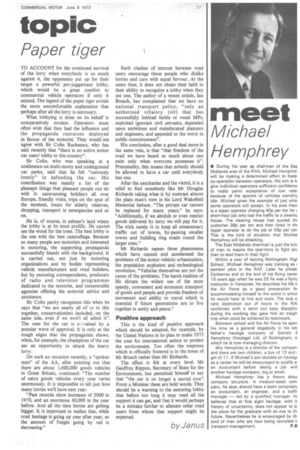topic
Page 79

If you've noticed an error in this article please click here to report it so we can fix it.
Paper tiger
TO ACCOUNT for the continued survival of the lorry when everybody is so much against it, the opponents put up for their target a powerful pro-juggernaut lobby, which would be a great comfort to commercial vehicle operators if only it existed. The legend of the paper tiger avoids the more uncomfortable explanation that perhaps after all the lorry is necessary.
What lobbying is done on its behalf is comparatively modest. Operators must often wish that they had the influence and the propaganda resources deployed in favour of the motorist. They would not agree with Sir Colin Buchanan, who has said recently that "there is no active motor car users' lobby in this country".
Sir Colin, who was speaking at a conference on multi-storey and underground car parks, said that he felt "curiously lonely" in defending the ear. His contribution was mainly a list of the pleasant things that pleasant people can do with it: caravanning holidays all over Europe, friendly visits, trips on the spur of the moment, treats for elderly relatives, shopping, transport in emergencies and so on.
He is, of course, in adman's land where the lobby is at its most prolific. He cannot see the wood for the trees. The best lobby is the one with the best camouflage. Because so many people are motorists and interested in motoring, the supporting propaganda successfully blends with the background. It is carried out, not just by motoring organizations and by bodies representing vehicle manufacturers and road builders, but by motoring correspondents, producers of radio and television programmes dedicated to the motorist, and innumerable agencies offering the motorist advice and assistance.
Sir Colin partly recognizes this when he says that "we are nearly all of us in this together, conservationists included, on the same side, even if we won't all admit it". The case for the car is s_ ained by a popular wave of approval. It is only at the rough edges that the propaganda shows, when, for example, the champions of the car see an opportunity to attack the heavy lorry.
On such an occasion recently, a "spokesman" of the AA, after pointing out that there are about 1,600,000 goods vehicles in Great Britain, continued: "The number of extra goods vehicles every year varies enormously. It is impossible to tell just how many lorries we'll have next year.
"Past records show increases of 2000 in 1970, and an enormous 60,000 in the year before. And all the time lorries are getting bigger. It is important to realize that, while road haulage is going up year after year, so the amount of freight going by rail is decreasing." Such clashes of interest between road users encourage those people who dislike lorries and cars with equal fervour. At the same time, it does not shake their faith in their ability to recognize a lobby when they see one. The author of a recent article, Ian Breach, has complained that we have no national transport policy, "only an authorized villainry (sic) that has successfully lobbied feeble or venal MPs, exploited ignorant civil servants, depended upon ambitious and maleducated planners and engineers, and appealed to the worst in public consciousness".
His conclusion, after a good deal more in the same vein, is that "that freedom of the road we have heard so much about can exist only when everyone possesses it". Presumably, this means that nobody should be allowed to have a car until everybody has one.
After the saccharine and the vitriol, it is a relief to find somebody like Mr Douglas Richards taking what is by contrast almost the plain man's view in his Lord Wakefield Memorial lecture. "The private car cannot be replaced for many years," he says. "Additionally, if we abolish or even restrict goods delivered by lorry we will pay for it. The trick surely is to keep all unnecessary traffic out of towns, by-passing smaller towns and building ring roads round the larger ones."
Mr Richards names three phenomena which have caused and accelerated the problems of the motor vehicle: urbanization, the population explosion and technological revolution, "Vehicles themselves are not the cause of the problems. The harsh realities of life dictate the widest use of the most speedy, convenient and economic transport of goods and people and provide freedom of movement and ability to travel which is essential if future generations are to live together in amity and peace."
Positive approach
This. is the kind of positive approach which should be adopted, for example, by the United Nations in its plan to make 1973 the year for international action to protect the environment. Too often the response which is officially fostered is in the tones of Mr Breach rather than Mr Richards.
The effect is felt at every level. Mr Geoffrey Rippon, Secretary of State for the Environment, has permitted himself to say that "the car is no longer a sacred cow". From a Minister these are bold words. They should be a warning to the motoring lobby that before too long it may need all the support it can get, and that it would perhaps be a mistake further to alienate other road users from whom that support might be expected.
by Janus












































































































































